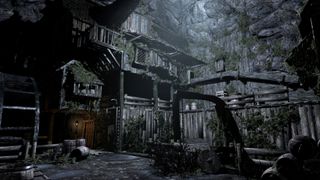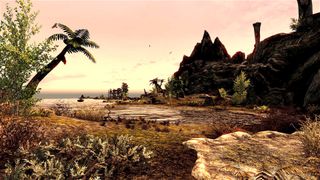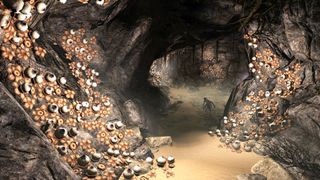
Enderal takes place two and a half years after the events of Nehrim, and although newcomers can expect to jump aboard with little difficulty, recurring characters and nods to its predecessors await those more familiar with the lore of the series. The aftermath of Nehrim has sunk the land into civil war, forcing the game’s protagonist to flee to the isolated continent of Enderal. Very quickly, however, it becomes clear that all is not well and that a ‘red madness’ has taken over the minds of Enderal’s inhabitants.
The protagonist begins to have surreal and disturbing dreams in which he happens upon the theocratic Order of Enderal. He learns of ‘Cycles’—passages of civilisation which see its citizens live, prosper, and then miraculously disappear without trace. It’s all very dark, but Lietzau makes clear that’s it’s not as black and white as it may first appear on paper. It’s not as simple as putting rest to a ‘demon army’ which The Order appears to represent—rather Enderal’s plot is to be multi-faceted, ominous, and complex with no immediately obvious friends or foes.
What makes Enderal different from Skyrim besides this surrogate storyline? Perhaps the most obvious transformation is the mod’s overhauled class system, which itself adopts a modified version of SkyUI, the community-made improvement of Bethesda’s user interface. “Basically the intention was to make a class system which is more traditional, but still has all the advantages of a sandbox skill system,” says Lietzau. “While in Skyrim you could basically skill every perk that was there, in Enderal you have nine classes and every class improves two skills. You can specialise in two, perhaps two and a half classes. That means you kind of have to commit yourself to a path, and we did this to create a sense of identity for the player.”
Another significant change is the omission of Skyrim’s signature Dragonshouts. Given that Enderal’s protagonist is not the Dragonborn, this change is hardly surprising, but it will change the feel of the game. Special skills known as ‘Talents’ stand in the place of shouts. Every class has two Talents that can be unlocked via the assigned perk tree, which allow the player greater variety in combat. In developing these, the player’s combat style will ultimately reflect their class.

Levelling up in Enderal is different to Skyrim in that SureAI has completely disabled the native ‘learning by doing’ protocol, instead allowing players to gain traditional experience points by killing monsters, completing quests, exploring locations, and possibly even by being witty in dialogue scenarios. Once the player has a certain number of experience points, they can level up. A single Skill Point is also provided at this stage which can be transferred to the class tree, and thus work towards buying the player new Talents.
“There are also Learning Points and Craftsman Points,” adds Lietzau. “Learning Points can be used to advance your skills with trainers—it’s a little different from the trainers in Nehrim because in Enderal you can buy books from trainers, meaning you don’t have to go back every time you level up. Instead you can buy, say, five books that train your one-handed skill, but you must have the Learning Points to consume them.”
A precise shot from the hero’s bow ignites the oil, toasting everything in the vicinity
Players also have Craftsman Points, which operate in a similar fashion. “While we thought things like speechcraft in Skyrim were hardly ever used—players tended to consider points too precious to use on things like this—in Enderal you can use your CPs to increase your crafting skills, or your speechcraft skill. I think it’s also safe to say that this system makes crafting and skills like speechcraft a lot more useful.”
The biggest gaming news, reviews and hardware deals
Keep up to date with the most important stories and the best deals, as picked by the PC Gamer team.
These are major, cultured changes and it’s easy to get bogged down in the finer intricacies without seeing them firsthand. To put things into context, SureAI demonstrates Talents in action. By pulling from the ‘Trickery’ and ‘Vagabond’ disciplines respectively, you’re able to combine a flask of oil with a flame-tipped arrow, so I watch as deep within a dingy catacomb SureAI’s player character smashes a jug of oil against the floor, catching an unsuspecting enemy’s attention in the process. The enemy charges, only to slip on the oil spill and tumble to the ground. A precise shot from the hero’s bow ignites the oil, toasting everything in the vicinity—enemy included.

This mix-and-match mentality echoes the Plasmid system of BioShock, and Lietzau assures me a vast array of combinations await keen conceptual connoisseurs. He admits that it is also possible to sneak your way through dungeons, avoiding foes whilst hugging the shadows—but when there appears to be so much scope and so much potential in this nuanced combat system, why would you not want to get your hands dirty?
My conversation with Lietzau and Scheer eventually leads me to two burning questions I have to ask. Firstly: if this is a game rooted in Skyrim, aesthetically, if nothing else, do SureAI think they’ve made a better game?
Scheer laughs, almost as if he’s surprised that I’ve asked, but at the same time surprised that it’s taken almost an hour of chatting for the question to come up. “Well I’d say we definitely succeeded in delivering the same standard of quality,” he offers diplomatically. “Enderal plays like a triple-A roleplaying game and this is something we’re very proud of. In terms of if it’s better—that really depends on the player. As I say, we have a different focus, the focus on the whole world just feels different. I think it’s up to the players to determine if they enjoy it more or less than Skyrim but I think we definitely succeeded in making something comparable to Skyrim.”
I’m not surprised by the conservative response. First and foremost these guys are Skyrim fanatics, and it would be uncharacteristic for them to criticise their core inspiration. Nevertheless they’re clearly very passionate about their own game. They’ve worked incredibly hard on Enderal—and on all of their projects—and know that the best way to definitively answer the question one way or another is to release the game into the world and let the public decide.
PC Gamer is the global authority on PC games—starting in 1993 with the magazine, and then in 2010 with this website you're currently reading. We have writers across the US, Canada, UK and Australia, who you can read about here.
Most Popular



